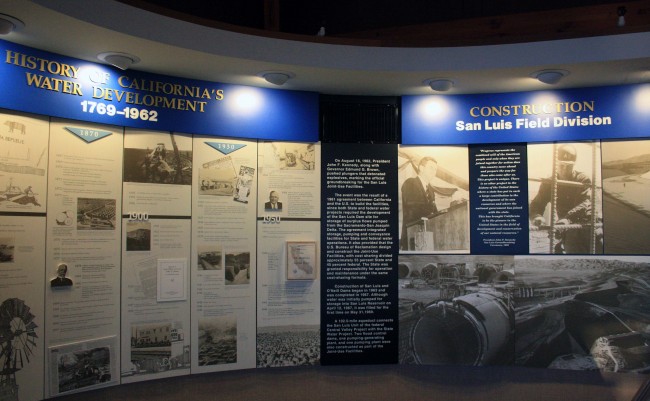Romero Visitor Center – San Luis Reservoir
Photo by adam Blauert
Romero Visitor Center – San Luis ReservoirDrivers heading out of Merced County over Pacheco Pass often notice the sign for the Romero Visitor Center at the San Luis State Recreation Area and wonder what it is.
For several years I did this – always on my way to get somewhere else. Finally last month I stopped to check it out.
Sisk Dam
Located at the top of the long span of Sisk Dam, the visitor center has exhibits about the history of the area, the construction of the dam, and California’s massive water storage and delivery system. Tours are available and a variety of films about water in California can be shown upon request.
If you’ve ever wanted to know more about water use and management in the Golden State, this is a great place to start.
Hours and cost
Open from 9AM to 5 PM daily (except major holidays), it is an easy and relatively quick stop on your way to somewhere else.
Better yet, admission is free. While you are there you can learn about recreational opportunities at the San Luis State Recreation Area and other recreation areas within the California State Water Project System from the Department of Water Resources guide on duty.
California Department of Water Resources
Although most of the visitor services within the San Luis SRA are operated by California State Parks, the Romero Visitor Center is operated by the California Department of Water Resources.
The reservoir was constructed between 1963 and 1967. Part of both the State Water Project and the Central Valley Project, the reservoir holds water from the Sacramento-San Joaquin River Delta before it is delivered throughout the state via the California Aqueduct and the Delta-Mendota Canal.
This redistribution of the state’s water is part of what makes modern California and possible. In a state where much of the land is desert (less than 10 inches of precipitation annually) or semiarid (less than 20 inches annually), water management is tremendously important to support a population of 38 million inhabitants, plus agriculture, industry, commerce, recreation, tourism, and wildlife.
Largest off-stream reservoir in the United States
385-foot tall rock and earthfill Sisk Dam forms the fifth-largest reservoir in California. Holding 652 billion gallons of water when full, the lake is only surpassed in size by Shasta, Oroville, Trinity, and New Melones.
It is also the largest off-stream reservoir in the United States.
Rather than stopping the flow of a river along its natural course, an off-stream reservoir holds water that has been pumped away from its natural location.
With this year’s worrisome dry winter, it’s a great time to increase your knowledge of this precious and scarce resource.
Although the reservoir is currently near full capacity after last year’s exceptional winter, it may soon be returning to the low levels that were so common a couple of years ago. Now is the time to enjoy the beauty of the reservoir.
For optimal viewing, pick a day with clear skies and clean air.
If we continue to get precipitation the hills may be very green by March and April. Great wildflower shows are common after wet winters.
Tule Elk
From the patio behind the visitor center, visitors can use free telescopes to view the lake and the surrounding hills.
If you’re lucky, the area’s herd of native tule elk may be within sight. On my recent visit they were grazing close to the dam.
For more information
go to http://www.water.ca.gov/recreation/locations/sanluis/sanluisvisitor.cfm
or call (209) 827-5353.






Adam Blauert, a high school teacher and avid outdoors enthusiast, has dedicated the majority of his life to Merced County. His passions include fishing, backpacking, delving into local history, and exploring the wonders of the western states.